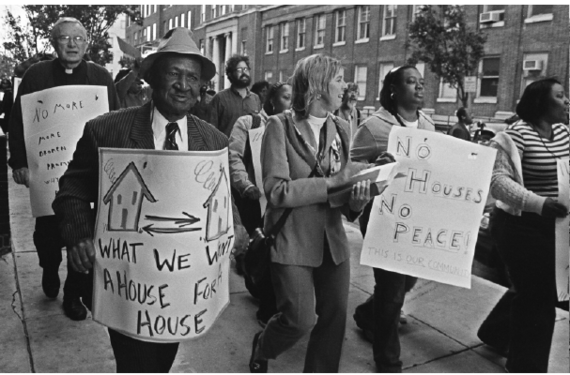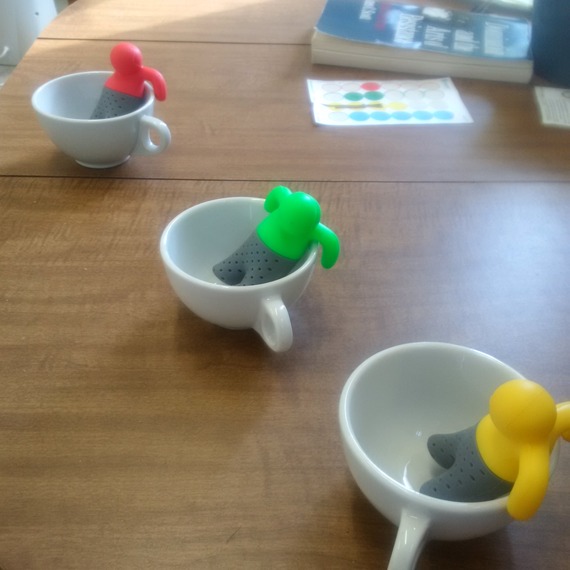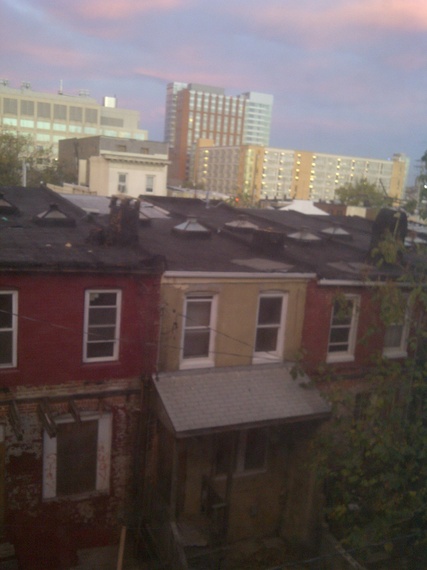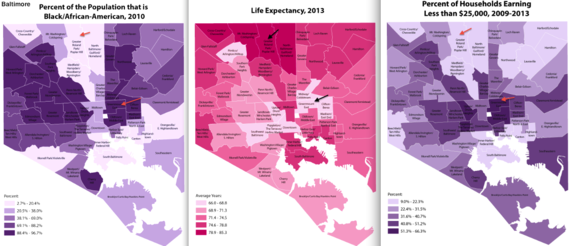After leaving Baltimore for more than two years, I returned to my old neighborhood in Middle East Baltimore, to find it still filled with despair. To the same address, also a space of despair--on a block where half the houses are boarded, where my view is another block of abandoned houses. Looking out the windows to the west, I see the towers and garages of the Johns Hopkins Medical Campus beyond the blocks of abandoned row houses. The neon lights shine at night from the top of the new 356-unit student housing complex two blocks away. This building stands tall where previously row houses were home to a community of 800 families and businesses, forced to leave their so that Johns Hopkins could build its new Biotech Park in 88 acres of gentrification.
The Johns Hopkins enterprise, in partnership with government and foundations like Annie E. Casey, decided that it was okay in the 21st century to continue the 1960's tactics of "negro removal." This term came of age in the 1960's during the federal program of urban renewal when mass displacement/removal of African Americans from their homes to areas not significantly socioeconomically better occurred. I worked with community groups to demand respect for the rights of the historic residents of this community: to be compensated fairly for their land, and for their right to return to participate in the new new development. We won some of the battles but the war, the war against the poor, those with few resources, and those with dark skin, we lost. Not because we didn't fight night and day. But because this is a war long in the making. It is the war that built our country, the war that assured that those with little power would be exploited by those with more power. This is the same war that removed Native American Indians from their land, took the land of Mexicans, destroyed black communities, disinvested black, brown, and low income communities with redlining, interned Japanese Americans, used urban renewal with its constant displacement to continue to build power for the white and privileged classes, and reigns today in the form of mass incarceration and gentrification.
As activists challenging this power in its different forms, it is hard not to hate at times. To not be embroiled in anger and sadness. To not lose oneself in the energy of revenge, out of a self-righteous assurance that it is only fair to retaliate with greed, hatred, and delusion when it is greed, hatred, and delusion that drive the institutions that continue to amass wealth for the few on the backs of the many. But when I stay focused on an ethic of love in action I remember that it is the very manifestation of greed and hatred that is the enemy and retaliating in kind makes me no different from these institutions. Love allows me to have power over the oppression and manipulation of these institutions.
Still, today, many in the struggle for justice are not sure how love and spirit have any role in bringing justice and equity to bear on these power imbalances. There are also those in spiritual practices of all forms who are blind to the understanding that equity, justice, and non-discrimination--racial, environmental, and all forms of social--form the basis of their spiritual traditions. But these supposed separate worlds are not disconnected.
During our struggle against the Johns Hopkins Biotech park, our very first meeting place was a small Baptist church on Wolfe St, whose pastor became a leading activist in the struggle. The Methodist church on Caroline St. housed us several times as we moved around looking for a permanent space before the lyceum of St. Wenceslaus Church in Middle East Baltimore offered us office space. A Methodist pastor from a church on Ashland Avenue came to our meetings and encouraged us with her presence and from her pulpit; the pastor from a small Baptist church on Durham blessed our meetings and spoke out about the inequity of forced displacement. Pastors and congregants came to meetings, joined our protests for jobs and affordable housing, testified at city council hearings, and offered us sanctuary with place and prayers.  The pastor of St. Wenceslaus met with the Johns Hopkins developers to request that local children should have first priority to attend the school. Both the developers and city representatives were not happy that he was so outspoken--but what else could he do? The new school had landed in his parish, where his church had been a place of worship for 100 years in a community that had experienced constant neglect and injustice. It was about time his community reaped some of the benefits of gentrification.
The pastor of St. Wenceslaus met with the Johns Hopkins developers to request that local children should have first priority to attend the school. Both the developers and city representatives were not happy that he was so outspoken--but what else could he do? The new school had landed in his parish, where his church had been a place of worship for 100 years in a community that had experienced constant neglect and injustice. It was about time his community reaped some of the benefits of gentrification.
Imagine if all our places of worship were our places of justice work. Imagine if all spiritual leaders understood that their mission in their communities was to offer a refuge for struggles for justice. Imagine if there was no separation between love and justice. Our activism would be love in action.
Often in the spaces of justice work I walk in Baltimore, I am fearful to mention the word love. Mostly I feel there is no place for love in this work of social change. Taking a breath before speaking takes time and no one has time; time to see the humanity, the non-separation, between each other. So it was a joy this past week when our lawyers came for a meeting and we took the time to have tea. Not a tea bag, but loose leaf tea, spooned into infusers, and placed in small porcelain white tea cups. The infusers brought smiles to our faces, connecting us to the present moment together, mindfulness in action.  Having a regular practice where we cultivate peace in ourselves allows us to be peace in every moment, even a moment of activism. Peace activist and Zen Master Thich Nhat Hanh states: "peace in myself, peace in the world." When Oprah Winfrey asked him why he always exudes an energy of contentment and peace, he responded: "This is my training, this is my practice." She probed further about how he responds to stressful moments. He responded: "[I] go back to my breathing and try to be in that moment deeply. Because there is a possibility to try to handle every kind of event and the essential is to keep the peace in yourself." This training allows love to be the base of all action.
Having a regular practice where we cultivate peace in ourselves allows us to be peace in every moment, even a moment of activism. Peace activist and Zen Master Thich Nhat Hanh states: "peace in myself, peace in the world." When Oprah Winfrey asked him why he always exudes an energy of contentment and peace, he responded: "This is my training, this is my practice." She probed further about how he responds to stressful moments. He responded: "[I] go back to my breathing and try to be in that moment deeply. Because there is a possibility to try to handle every kind of event and the essential is to keep the peace in yourself." This training allows love to be the base of all action.
Practicing Buddhists, Muslims, Christians, and Jews all walk a path of justice and love, steeped in traditions that abhor discrimination of the poor. These spiritual and philosophical traditions recognized and upheld practices to transform the world as it existed then and as it exists now: unequal, with power accessible only to some. Spirituality and love were at the heart of social justice before the words became trendy.
Dr. Martin Luther King, Jr. spoke eloquently on many occasions about the creation of unequal communities both near and abroad and the love ethic needed to transform them. In two separate speeches he emphasizes this:
"America must hear the truth, if we are going to survive as a nation, somebody has got to have vision, somebody must be willing to stand up and be criticized and called every bad name, out of love for this country. Nobody should be considered disloyal because they dissent, because it is done out of love." -- "Let me say finally that I oppose the war in Vietnam because I love America. I speak out against it not in anger but with anxiety and sorrow in my heart, and above all with a passionate desire to see our beloved country stand as the moral example of the world. I speak against this war because I am disappointed with America. There can be no disappointment when there is not great love."
We're at a time of great disappointment in America. The front runner in the Republican Party espouses hatred en masse through the demonization of Muslims, Mexicans, women, and others. He is powerful and relentlessly inflicting harm against the least powerful among us. Unfortunately he represents a system that has failed all America, by failing most of America. The gap in income is growing, with the greatest inequality seen in southern states. Children in states with the greatest inequality are dropping out of school at greater rates than those with less inequality. Our zip codes and our race or ethnicity predict how long we can expect to live and the trajectory of our health: in Baltimore, if you live in Roland Park (white and wealthy) you can expect to live 20 years longer than if you live in Greenmount East (working class, poor and black); in the US the risk of HIV infection is greatest in Maryland with 1 in 49 people predicted to be HIV positive; 70% of families on a Navaho reservation in New Mexico don't have access to the very electricity being generated by the coal-powered plants nearby, but are exposed to the health effects of the sulfur and nitrogen oxide; the lifetime risk of becoming HIV positive among gay men is 1 in 2 for Black men, 1 in 4 for Hispanic men, and 1 in 11 for White men.
Our nation has advanced innovation in science and technology by spending billions of public dollars to do so through grants to universities who increasingly patent their research for private gain. As a nation we still have not figured out how to house the homeless, employ the growing unemployed and under-employed, provide access for health care for all, and prevent our most powerless populations from becoming sick and dying prematurely. (8) Yet this is what our love, our spiritual lives, and our common humanity calls out to us to do, as individuals and as a society.
As Dr. King said, it is because we love our nation that we hurt when we experience and see injustice. This time of disappointment and separation in our humanity requires even greater love. And it is this love that must drive our action, nothing else. As activists we are in a position to manifest the power of love in action. We can look to great role models in the forms of Jesus, Ghandi, and Mother Theresa. Most recently, Pope Francis called upon the leaders of the world to address poverty, those seeking refuge, and climate change. Communities of love and compassion continue to offer a refuge for our struggle for justice, providing a beacon of light. The lyceum of St. Wenceslaus Hall in Middle East Baltimore stands at the edge between the haves and the have-nots. Its leadership has taken a stand against injustice by housing the work of justice seekers, activists, and human rights defenders. Recently we had a meeting with the pastor of St. Wenceslaus Church across the alley and asked about renovating the lyceum into a community center, with co-operative ownership and shared leadership by community members, an intentional residential space housing activists whose work is rooted in peace. He offered us his blessing and invited a proposal for the church council's decision. We suggested that this church could offer a symbol to the surrounding community that the only power that can stand up to the power of greed, hatred, delusion and despair was justice based in spirit and love: the power of love in action. On Wednesday we will get an estimate for a new door to the lyceum; one that is glass and invites in those who walk by, a refuge of hope and renewal instead of despair and separation.


